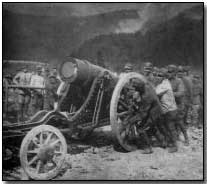Memoirs & Diaries - War is War - Guns, Guns, Guns
 "Eight days
out and sixteen days in... We are becoming acclimatised to
trench
warfare. We know by the singing of a shell when it is going to
drop near us, when it is politic to duck and when one may treat the sound
with contempt...
"Eight days
out and sixteen days in... We are becoming acclimatised to
trench
warfare. We know by the singing of a shell when it is going to
drop near us, when it is politic to duck and when one may treat the sound
with contempt...
"We know the calibres of the shells which are sent over in search of us. The brute that explodes with a crash like that of much crockery being broken, and afterwards makes a 'cheering' noise like the distant echoes of a football match, is a five-point-nine. The very sudden brute that you don't hear until it has passed you, and rushes with the hiss of escaping steam, is a whizz-bang.
"For a perfect imitation of a whizz-bang, sit by the open window of a railway compartment and wait until an express train passes you at sixty miles an hour. The funny little chap who goes tonk-phew-bong is a little high-velocity shell which doesn't do much harm. 'Minnies' and 'flying pigs' which are visible by day and night come sailing over like fat aunts turning slow somersaults in mid-air. Wherever one may be, and wherever they may be going to drop, they always look as if they are going to fall straight on top of one. They are visible at night because they have luminous tails, like comets.
"There is no explosion which, for sheer gut-stabbing ferocity, is quite like that of a minenwerfer. The bursting of one close at hand was like one's conception of the end of the world, but although their local effect was terrific they did not do much damage laterally.
"The thing which, without warning, suddenly utters a hissing sneeze behind us is one of our own trench-mortars. The dull bump which follows, and comes from the middle distance out in front, tells us that the ammunition is a 'dud'. The German shell which arrives with the sound of a woman with a hare-lip trying to whistle, and makes very little sound when it bursts, almost certainly contains gas.
Miles and miles behind us there is a fifteen-inch Naval gun. This is only pooped off about twice a day. We don't hear it fired, but we hear, about seven miles up in the air, the sound of a single railway engine shunting through a station, and afterwards, very far distant, a dull roar...
We know when to ignore machine-gun and rifle bullets and when to take an interest in them. A steady phew-phew-phew means that they are not dangerously near. When on the other hand we get a sensation of whips being slashed in our ears we know that it is time to seek the embrace of Mother Earth. We have learned to have an awesome respect and fear of our own artillery and machine-gunners.
When we are out at night on working-parties in No Man's Land we learn to fear our own machine-guns as much as we do those of the Boche. Machine-gunners are light-hearted fellows. They make their guns say 'Om-tiddly-om-pom,' and then Brother Boche answers, 'Pom-pom.'
Next - Passchendaele
Photographs courtesy of Photos of the Great War website
'Billy' was the Australian nickname for a cooking-pot or can.
- Did you know?
